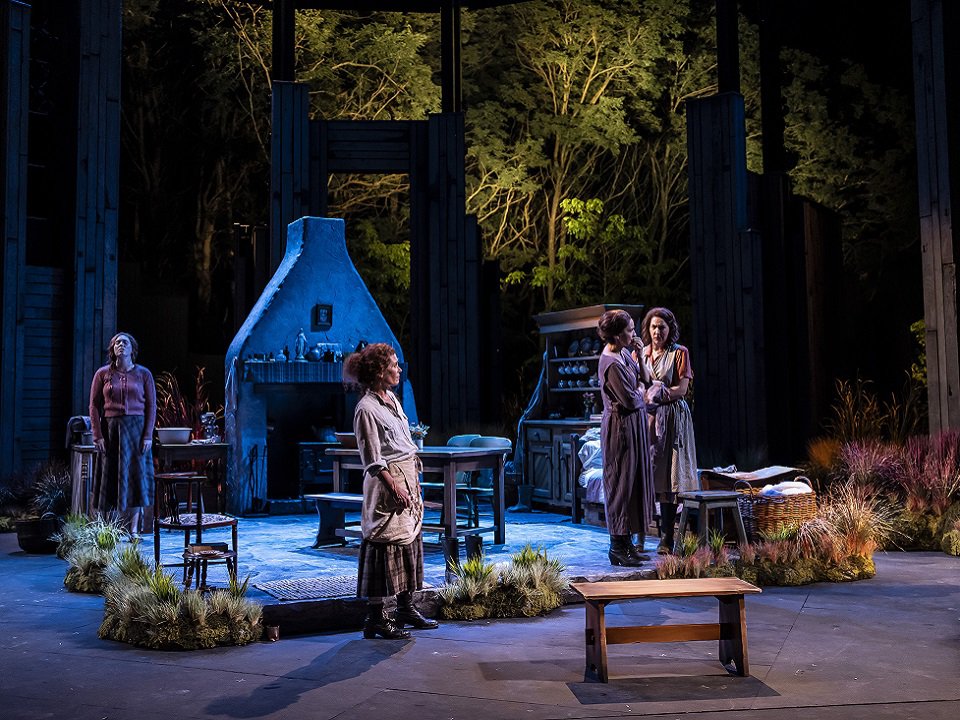American Players Theatre’s ‘Dancing at Lughnasa’ makes the most of setting, cast – Isthmus


Memory is a funny thing — a rush of remembrance can be sparked by any number of things: an object remembered from the past, a long-familiar smell, or an old song that reminds us of our youth.
In Dancing at Lughnasa, in repertory at American Players Theatre through Sept. 27., memories are sparked by music, as playwright Brian Friel presents a personal reverie of his childhood world in the mid-1930s. He recalls life in a small town in Ireland in the summer of his seventh year. Throughout the play, his memories are ferried along by music emanating from a tabletop radio, a new-fangled invention in its time.
Friel is often grouped with such great storytellers as Chekhov and Tennessee Williams. Dancing at Lughnasa touches on the larger themes of love, loss, disappointment, perseverance and the wide influence of the Catholic church. Like The Glass Menagerie, this is a memory play.
The narrator (Marcus Truschinski), who appears on the stage at pertinent moments in the production, is an adult looking back and guiding us through the story of his childhood. The child character of Michael is never seen on stage.
Instead,the audience sees Michael’s mother and aunts. The five sisters are trying to keep a household going when money is tight and society’s restrictions even tighter. Christina Mundy (Maggie Cramer), is Michael’s unmarried mother. Like her sisters Kate (Tracy Michelle Arnold), Maggie (Colleen Madden), Agnes (Laura Rook) and Rose (Elizabeth Reese), all have aged past the possibility of finding a husband and struggle daily to make ends meet.
All five actresses are superb, with Colleen Madden notable for her character’s ability to find joy in the smallest of things in this family’s constricted life. As the play opens, the careful balance among the sisters has been upended by the arrival of their brother Jack (James Ridge), a returning missionary priest who has been removed from his post in Africa. The unexpected appearance of Michael’s unreliable father, Gerry (Nate Burger), adds to the tension. Jack and Gerry bring thoughts of hedonism and the pull to escape, while the sisters’ small town life is strictly controlled by the old confines of duty and morality. Their carefully constructed world has no real future — and the dominoes have already started to fall.
As directed by Brenda DeVita, the staging of Dancing is a marvel. From the opening moments, when all the characters (save Gerry) trickle in from the many openings on APT’s stage, then freeze as the adult Michael narrates the scene, we are transported to a small farmhouse in Ireland in the 1930s. It seems to always be a bit chilly; there’s always a need for more turf for the fire. Daily life is routine — the chickens must be fed, knitting needs to be done, someone must go into town to the market. The actors navigate the two-level stage brilliantly. Though we can see no actual walls, they peer out of the unseen windows and wipe their feet at the unseen door, letting us feel just how restricted the lives are inside. Lights illuminate the actual forest behind the APT outdoor stage, emphasizing where the outside world begins (and ends). Music is almost a character in the play, allowing the sisters to occasionally succumb to the joy of dancing with wild abandon.
In Dancing at Lughnasa, adult Michael tells us that hearing the music of his memory is like hearing the music and its own echo at the same time. Friel’s play allows us to travel back to his idyllic past with him but also gives us plenty of evidence that times remembered with fondness may also be the root of some of our problems today.



